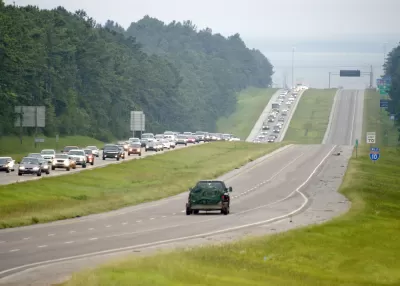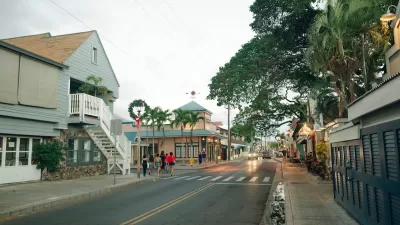Climate change is already causing displacement on a massive scale.

A feature article by Jeff Goodell for Rolling Stone raises the specter of mass migration caused by climate change. Goodell didn't have to dig too far into the history books for anecdotes—tales of residents fleeing Texas and Louisiana after Hurricane Harvey are plentiful. Still, Harvey was only one chapter of the extreme weather story in 2017:
In 2017, a string of climate disasters – six big hurricanes in the Atlantic, wildfires in the West, horrific mudslides, high-temperature records breaking all over the country – caused $306 billion in damage, killing more than 300 people. After Hurricane Maria, 300,000 Puerto Ricans fled to Florida, and disaster experts estimate that climate and weather events displaced more than 1 million Americans from their homes last year.
According to Goodell, the hope of rebuilding locations that have been repeatedly ravaged by the effects of climate change is unrealistic—with so much damage already done, extreme weather events and long-term droughts are only expected to get worse. Scientists warn that a massive shift in habitability is on the way in many places around the globe, including in the United States.
Goodell's feature coverage samples evidence from scientific study, tours post-Katrina New Orleans, examines the potential effect of rising sea levels and flooding on property values in Florida, and describes the feeling of extreme heat in Phoenix. There's even a map that lays out the expected "winners and losers" of climate change.
FULL STORY: Welcome to the Age of Climate Migration

Maui's Vacation Rental Debate Turns Ugly
Verbal attacks, misinformation campaigns and fistfights plague a high-stakes debate to convert thousands of vacation rentals into long-term housing.

Planetizen Federal Action Tracker
A weekly monitor of how Trump’s orders and actions are impacting planners and planning in America.

In Urban Planning, AI Prompting Could be the New Design Thinking
Creativity has long been key to great urban design. What if we see AI as our new creative partner?

How Trump's HUD Budget Proposal Would Harm Homelessness Response
Experts say the change to the HUD budget would make it more difficult to identify people who are homeless and connect them with services, and to prevent homelessness.

The Vast Potential of the Right-of-Way
One writer argues that the space between two building faces is the most important element of the built environment.

Florida Seniors Face Rising Homelessness Risk
High housing costs are pushing more seniors, many of them on a fixed income, into homelessness.
Urban Design for Planners 1: Software Tools
This six-course series explores essential urban design concepts using open source software and equips planners with the tools they need to participate fully in the urban design process.
Planning for Universal Design
Learn the tools for implementing Universal Design in planning regulations.
Gallatin County Department of Planning & Community Development
Heyer Gruel & Associates PA
JM Goldson LLC
City of Camden Redevelopment Agency
City of Astoria
Transportation Research & Education Center (TREC) at Portland State University
Jefferson Parish Government
Camden Redevelopment Agency
City of Claremont





























